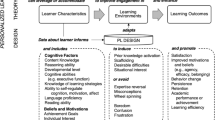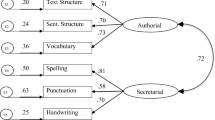Abstract
A study that involved parents as reading tutors was carried out at home during the summer with four elementary children, three with learning disabilities. One purpose was to determine the effects of tutoring in the basal reader on reading rates at home. Another purpose was to determine potential generalization effects as a result of parent tutoring on different academic tasks at home and, later at school, on different and similar tasks. A combination multiple-baseline and reversal design tested for replication and generalization effects. Increases in correct rates were noted for the targeted variables across conditions. The results indicated that parents tutoring with school basal texts during the summer produced marked increases in reading rates that generalized at home to different academic tasks and at school to different and similar tasks. This suggests that parents, when using specific tutoring procedures, can increase their children's academic skills.
Similar content being viewed by others
References
Across the fence. (1985). Lexington, Massachusetts: Ginn & Company.
Baer, D. M., Wolf, M. M., & Risley, T. R. (1968). Some current dimensions of applied behavior analysis.Journal of Applied Behavior Analysis, 1, 91–97.
Barefoot island. (1985). Lexington, Massachusetts: Ginn & Company.
Birds fly, bears don't. (1985). Lexington, Massachusetts: Ginn & Company.
Broden, M., Beasley, A., & Hall, R. V. (1978). In-class spelling performance: Effects of home tutoring by a parent.Behavior Modification, 2, 511–530.
Delquadri, J. (1978).An analysis of the generalization effects of four tutoring procedures on the oral reading responses of eight learning disabled students. Unpublished doctoral dissertation, Department of Human Development and Family Life, University of Kansas, Lawrence.
Delquadri, J. C., Copeland, R. E., & Hall, R. V. (1976, March).The effects of a paraprofessional tutoring program on the in-class oral reading and math performance of a child with learning difficulties. Paper presented at the International Conference of the Association for Children with Learning Disabilities, Seattle, Washington, March 2–6, 1976.
Delquadri, J., Greenwood, C., Stretton, K., & Hall, R. V. (1983). The peer tutoring game: A classroom procedure for increasing opportunity to respond and spelling performance.Education and Treatment of Children, 6, 225–239.
Delquadri, J., Greenwood, C. R., Whorton, D. Carta, J. J., & Hall, R. V. (1986). Classwide peer tutoring.Exceptional Children, 52, 535–542.
Duvall, S. F. (1989).A review of behavioral home-school programs for improving student's academic performance at school. Review Paper, submitted to the Department of Human Development and Family Life, University of Kansas.
Greenwood, C. R., Delquadri, J., & Hall, R. V. (1984). Opportunity to respond and student academic performance. In W. L. Heward, T. E. Heron, J., D. Hill, & J. Trap-Porter (Eds.),Behavior analysis in education (pp. 58–88). Columbus, OH: Charles Merrill.
Greenwood, C., Delquadri, J., & Hall, R. V. (1989). Longitudinal effects of classwide peer tutoring.Journal of Educational Psychology, 81(3), 371–383.
Greenwood, C. R., Terry, B., Wade, L., Dinwiddie, G., & Delquadri, J. C. (1981, November).Process-product analysis of peer tutoring: Instructional control of academic responding, social behavior, and achievement outcome. Paper presented at the 15th Annual Convention of the Association for the Advancement of Behavior Therapy, Toronto, Canada, November 13–15, 1981.
Hall, R. V., Delquadri, J. C., Greenwood, C. R., & Thurston, L. (1982). The importance of opportunity to respond in children's academic success. In E. Edgar, N. Haring, J. Jenkins, & C. Pious (Eds.),Serving young handicapped children: Issues and research (pp. 107–149). Austin, TX: Pro-Ed.
Harris, J. W. (1981).A comparison of out-of-class tutoring formats on the in-class oral reading performance of learning disability students. Unpublished doctoral dissertation, University of Kansas.
Kazdin, A. E. (1982). Single-case experimental designs in clinical research and practice.New Directions for Methodology of Social and Behavioral Science, 13, 33–47.
Love, J. M., & Biervliet, A. V. (1984). Training parents to be reading tutors: Generalization of children's reading skills from home to school.Exceptional Child, 31, 114–127.
O'Dell, S. (1974). Training parents in behavior modification: A review.Psychological Bulletin, 81, 418–433.
Open doors. (1985). Pensacola, FL: A Beka Book.
Paths of gold. (1974). Pensacola, FL: A Beka Book.
Paths to follow. (1985). Pensacola, FL: A Beka Book.
Robinson, G. C. (1986).An analysis of the effects of tutoring procedures used in a remedial setting on the regular classroom reading responses of three LD children: Integration in an individual education program. Unpublished doctoral dissertation, Department of Human Development and Family Life, University of Kansas, Lawrence.
Schumaker, J. B., Hovell, M. F., & Sherman, J. A. (1977). An analysis of daily report cards and parent-managed privileges in the improvement of adolescents' classroom performance.Journal of Applied Behavior Analysis, 10, 449–464.
Ten times around. (1985). Lexington, Massachusetts: Ginn & Company.
Travato, J., & Bucher, B. (1980). Peer tutoring with or without home-based reinforcement, for reading remediation.Journal of Applied Behavior Analysis, 13, 129–141.
Treatshop. (1984). Pensacola, FL: A Beka Book.
Trice, A. D., Parker, F. C., Furrow, F., & Iwata, M. M. (1983). An analysis of home contingencies to improve school behavior with disruptive adolescents.Education and Treatment of Children, 6, 389–399.
Witt, J. C., Hannafin, M. J., & Martens, B. K. (1983). Home-based reinforcement: Behavioral covariation between academic performance and inappropriate behavior.Journal of School Psychology, 21, 337–348.
Woodcock, R. W., & Johnson, M. B. (1977). Woodcock-Johnson Psycho-educational Battery, Part II.Tests of Achievement. Teaching Resources: Allen, TX.
Author information
Authors and Affiliations
Rights and permissions
About this article
Cite this article
Duvall, S.F., Delquadri, J.C., Elliott, M. et al. Parent-tutoring procedures: Experimental analysis and validation of generalization in oral reading across passages, settings, and time. J Behav Educ 2, 281–303 (1992). https://doi.org/10.1007/BF00948819
Accepted:
Issue Date:
DOI: https://doi.org/10.1007/BF00948819




